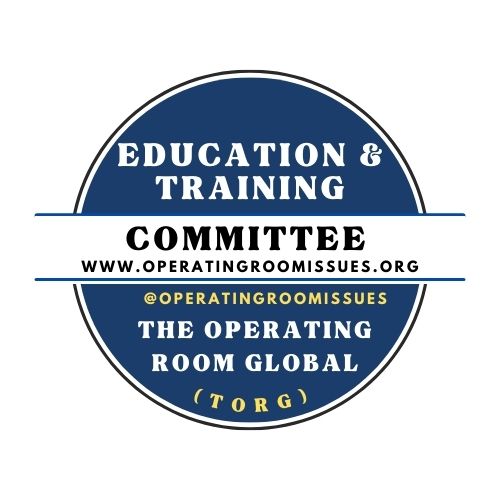
In the Education and Training Committee of The Operating Room Global (TORG), the following voluntary designations and roles exist:
- Chairperson: The Chairperson leads the committee, facilitates meetings, ensures smooth coordination among committee members, and oversees the implementation of education and training initiatives. The Chairperson’s guidance and support are invaluable in driving the success of the committee’s endeavours. Together, the chairperson contributes to delivering high-quality, interactive, and impactful educational experiences for healthcare professionals in the surgical field.
- Vice Chairperson/Training Facilitator: The Vice Chairperson/Training Facilitator holds a vital role within the TORG Education and Training Committee. This position involves delivering educational sessions, workshops, and training programs to healthcare professionals, providing hands-on training, demonstrations, and guidance. The Vice Chairperson/Training Facilitator collaborates with external stakeholders, bringing diverse perspectives and expertise into the training programs. They also work closely with the Chairperson to ensure alignment with TORG’s objectives and strategic vision. Their contributions are crucial in delivering high-quality, interactive, and impactful educational experiences for healthcare professionals in the surgical field.
- Secretary: The TORG Education and Training Secretary is responsible for ensuring the smooth functioning of the committee. This role involves scheduling and coordinating meetings, preparing agendas, and handling logistics. During meetings, accurate minutes are recorded and distributed to committee members. The Secretary also assists with communication efforts, manages emails, and facilitates information flow. They maintain an organized document management system for committee-related materials and provide administrative support, including scheduling meetings and coordinating training sessions. Collaboration with other committee members on educational initiatives and tracking progress towards goals is another important aspect of this role. In summary, the Education and Training Secretary is vital in facilitating effective communication, documentation, and organization within the committee.
- Curriculum Developer: The Curriculum Developer works closely with the Training Facilitator/Vice Chairperson to create engaging and effective educational materials. They research and compile relevant resources, design instructional materials, and develop assessment methods to evaluate the learning outcomes of the training programs. They strive to enhance the quality and accessibility of surgical education materials.
- E-Learning Specialist: The E-Learning Specialist focuses on developing online learning platforms and resources. They leverage technology to create interactive e-learning modules, webinars, and online courses. They collaborate with subject matter experts to convert educational content into engaging digital formats, making it accessible to a wider audience.
- Committee Members/Moderators: As a committee member/moderator, you will actively participate in discussions, share insights, and contribute to the overall planning and execution of education and training initiatives. Your role involves collaborating with fellow committee members, providing input on program development, and supporting the committee’s goals. Your expertise and unique perspective will help shape the direction and success of TORG’s efforts to improve surgical care worldwide.
Click Here to Meet the TORG Training and Education Committee

Collective Roles of Committee Members:
- Collaboration: The committee members work together to foster collaboration among healthcare professionals, trainers, and educators. They engage with external organizations and experts to enhance the reach and impact of education and training initiatives.
- Needs Assessment: The committee conducts needs assessments to identify the specific educational requirements of healthcare professionals in underserved areas. They gather feedback, conduct surveys, and analyze data to tailor the programs to address the needs and challenges of the target audience.
- Evaluation: The committee collaborates to evaluate the effectiveness and impact of the education and training programs. They collect feedback from participants, analyze outcomes, and make continuous improvements to ensure the programs meet the desired objectives.
- Resource Development: The committee collectively works on developing educational resources, such as manuals, videos, and reference materials. They gather and share relevant research, best practices, and evidence-based guidelines to enhance surgical education and training globally.
- Continuous Learning: The committee members actively engage in professional development and stay updated on the latest advancements and trends in surgical education and training. They share their knowledge and expertise within the committee and with external stakeholders to drive continuous learning and improvement.
By fulfilling their individual roles and collaborating effectively, the Education and Training Committee of TORG aims to provide valuable educational resources and training programs to enhance surgical care and improve patient outcomes globally.